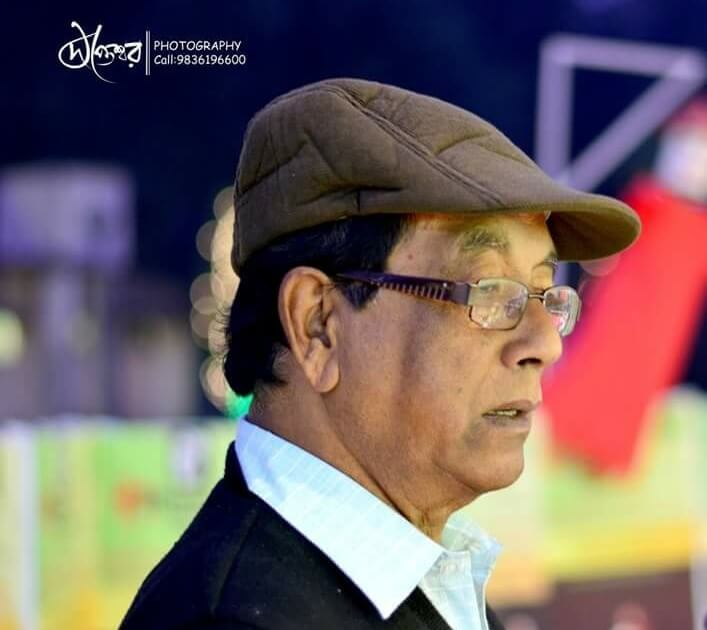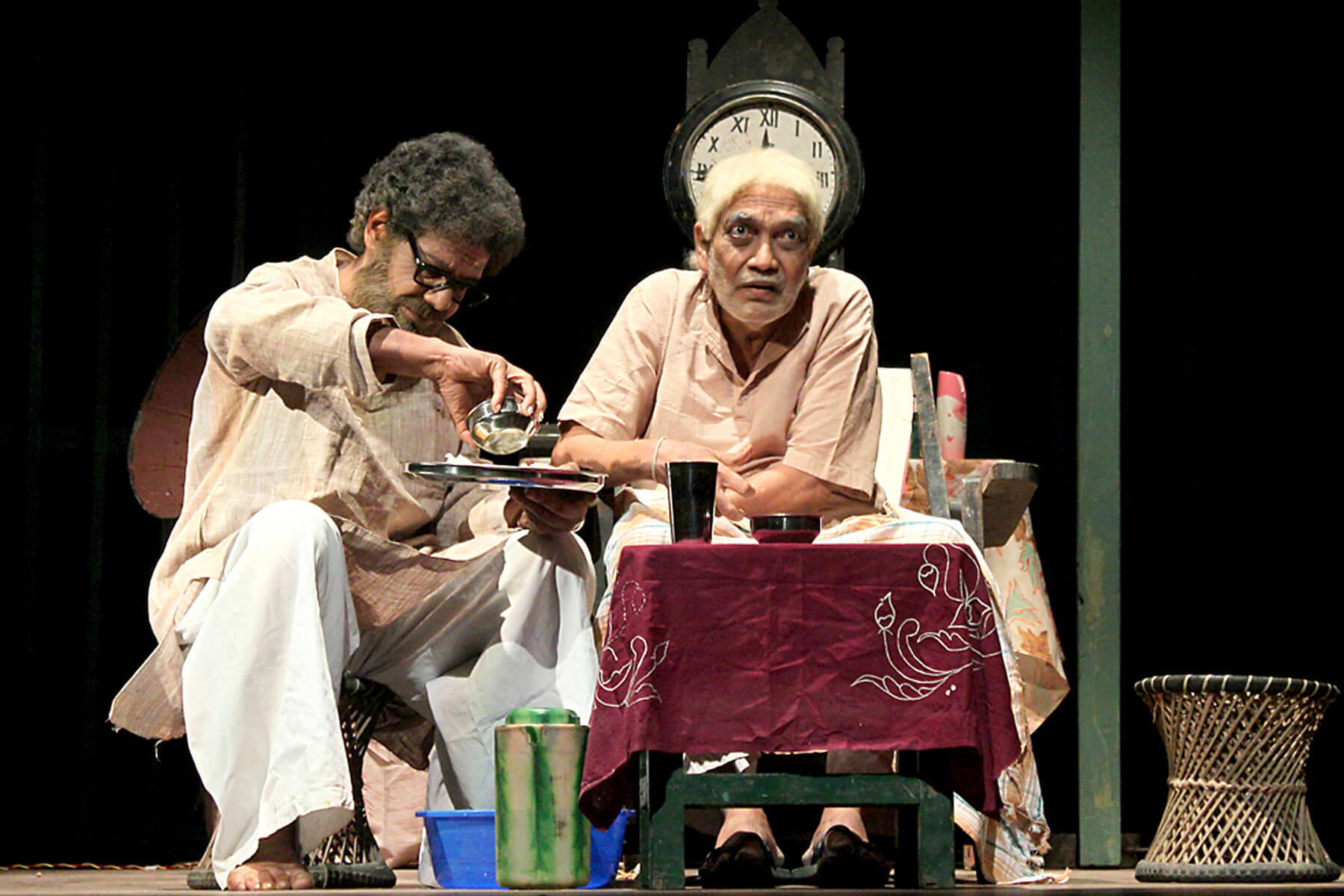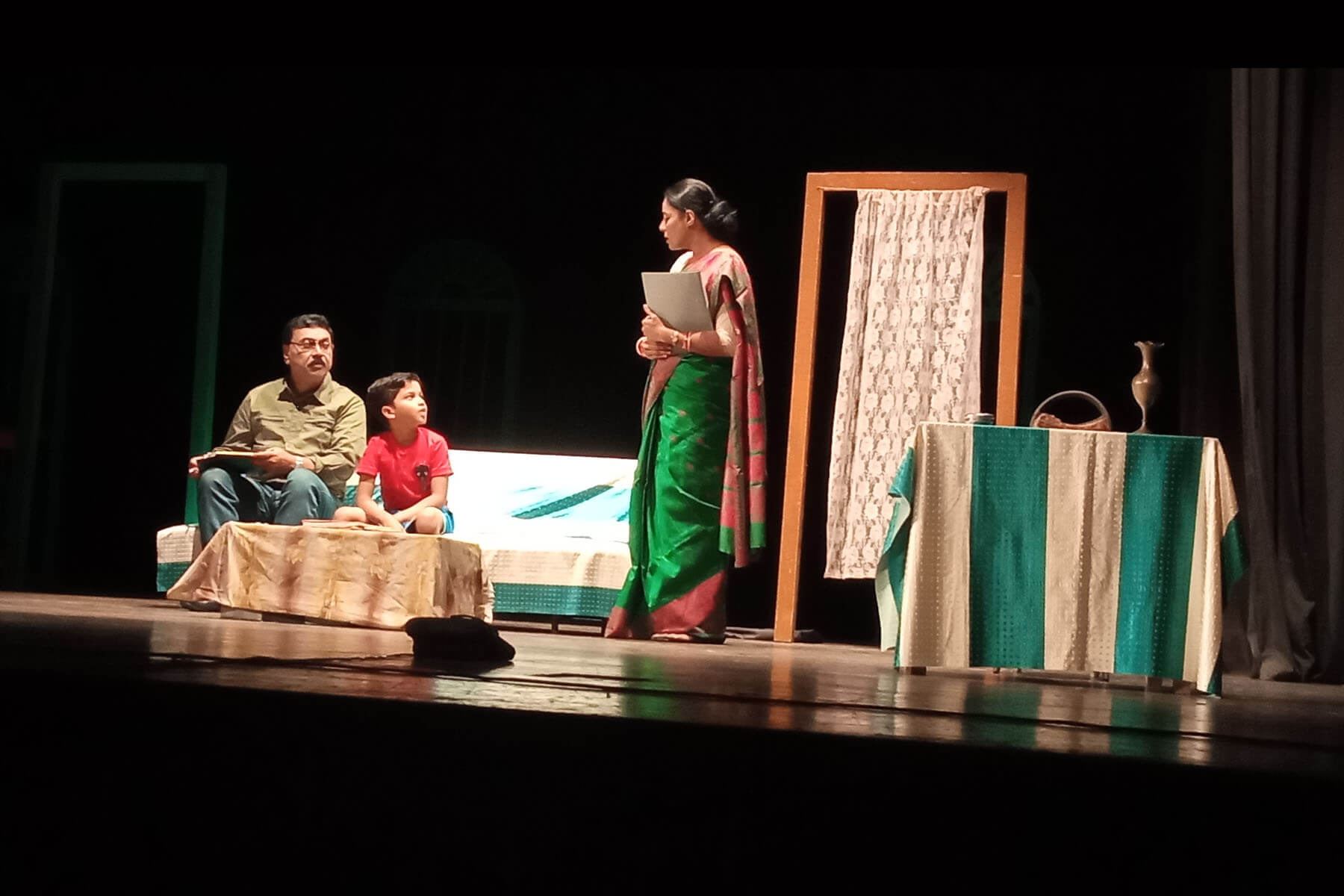24.03.2024 (Sunday) at Ustav, IOCL
25.03.2024 (Monday) at Jayadev Sadan, Paradip Port
ANIKET SANDHYA
HA-ZA-BA-RA-LA, West Bengal
Chandan Sen
Bengali
120 mins

THE DIRECTOR…..
French playwright PIERRE de BEAUMARCHAIS (1732-1799) was known for having dared to publish Voltaire and two anti-aristocratic plays of his own – The Barber of Seville (1775) and The Marriage of Figaro (1781). He was a French polymath. At various times in his life, he was a watchmaker, inventor, musician, diplomat, arms dealer and revolutionary etc.
Chandan Sen, born on January 11, 1944, emanates from the cultural tapestry of Chakdaha in the Nadia district of West Bengal. Although he adorned the role of an English literature luminary at Chakdaha Bapuji Vidyapith, his profound ardor resides in the realm of theatre. A venerable figure for over four decades, Sen has been an unwavering and integral presence within the theatrical milieu, notably through his association with the esteemed group Ha-Za-Ba-Ra-La. His creative oeuvre boasts approximately 30 plays, a meticulous blend of original compositions and compelling adaptations.
Renowned theatre troupes in Kolkata, including Sayak, Theatre Workshop, and Sansta, have consistently showcased Sen’s literary gems. Among his distinguished works are ‘Dui Huzurer Gappo,’ ‘Gyan Brikkher Phal,’ ‘Dayabaddha,’ ‘Aniket Sandhya,’ ‘Phirey Eso Prem,’ and ‘Bipajjanak.’ In acknowledgment of his lifelong dedication to the rich tapestry of Bengali theatre, he was bestowed with the illustrious Dinabandhu Puraskar, a testament to his indelible impact on the cultural landscape. Chandan Sen’s journey is a narrative woven with literary finesse and theatrical brilliance, enriching the cultural fabric of West Bengal.
THE GROUP…..
For half a century, the illustrious Ha Za Ba Ra La has been an indomitable force in the theatrical realm, leaving an indelible mark on the cultural landscape of West Bengal. Established in 1960, this avant-garde group theatre has ceaselessly embarked on a quest for theatrical excellence, with an unwavering commitment to probing the depths of societal issues. Its productions, spanning the bustling streets of Calcutta to the hinterlands of rural Bengal, have exemplified extraordinary merit, exploring the very fabric of drama in form and subject.
At the helm is the visionary playwright and director, Sri Chandan Sen, a luminary twice honoured with the prestigious Paschim Banga Natya Academy’s Best Playwright Award and the coveted “Dinabandhu Mitra” Award from the Government of West Bengal. The ensemble boasts well-trained members proficient in every facet of theatre, from stage preparation to light design, projection, music, makeup, and beyond. The group’s dedication extends beyond the stage, as exemplified by the Ha Za Ba Ra La School of Drama, nurturing young talents since 2018.
Noteworthy accolades adorn the group, with Sri Subhas Maitra earning the Paschim Banga Natya Academy’s Best Actor Award, while SNA Awardees, Sri Deb Sankar Halder and Sri Gautam Halder, grace the theatrical productions. With its own Natyasala, Ha Za Ba Ra La stands as a beacon, not just a theatre group but a cultural institution, tirelessly illuminating the realms of drama, societal reflection, and artistic mentorship.
THE PLAY…..
In the contemporary landscape, T.S. Eliot’s portrayal of “hollow men” finds resonance as our modern society progressively undermines age-old values, questioning traditional family bonds. The erosion of these principles leads to a disheartening sense of alienation within our family structures. The narrative unfolds with Viswadeb, an octogenarian facing relocation to an old-age home due to frailty, highlighting the societal tendency to view aging individuals as liabilities. Karnadeb, his son, anticipates his own impending “uselessness” by societal standards, recognizing the looming challenges. Meanwhile, Priyatosh and Malabika, a young couple, grapple with conflicting emotions and responsibilities amidst shifting dynamics.
Amidst this turmoil, Papu, embodying infantile innocence, becomes a poignant voice protesting a society that devalues its elderly. The play intricately weaves generational shifts, societal values, and emotional bonds, offering a compelling reflection on the urgent need for compassion, empathy, and a reconsideration of priorities in the face of evolving societal challenges. It serves as a stark reminder to navigate the complexities of a changing world with a renewed commitment to familial connections.

DIRECTOR’S NOTE…..
The play has been written, directed or produced to depict the critical present and the inevitably appalling future. While composing and producing my play on a self-centric modern familial arena, I envisaged two old non rude protestants, an octogenarian music crazy fellow, partially paralyzed, but enjoying to survive anyhow on listening to old music, while his son, a wise lecturer of 60 years sharing his father’s pain and helplessness of solitude (both the father and his son are now wifeless). There is a little sharer of this pain of solitude the 9-year-old junior most member of this family supervisors- a modern careerist Bank employee-couple, who ignoring their wise and active father-in-law and their only little son recently plans to send the infirm octogenarian to a well- run old age Home. Their dear child utters the ultimate protest !
The set and light design is made with the help of the able set and light designing persons, while framing the set design, on the voluntary suggestion of untimely demised theatrical talent Joy sen. The set design has borne a symbolic division of three separate parts on the foreground stage. The middle or centre represents an old room with old gramophone, old records and C.Ds. and old fading pictures of the musical tytans of the yester years. The left part of the stage only holds a chair and an old table where an old phone set and some files are visible. This is the room of the sensitively sympathetic Lecturer who off and on visits his unfortunate paralyzed father through a middle door of this room. On the extreme right, is a room for the Bank-employee couple and their little, sensitive child who off and on steps out of his study to give company to his dear grandy (great grandfather) and enjoy it. I have designed the total play separately focusing on its three parts of three generations, backed up by the little child who represents protesting fourth generation. The crux of this symbolically realistic play is its music design, enriched by a series of popular old songs both classical and non-classical.

Cast…..
Subhas Maitra
Prabir Dutta
Tapan Biswas
Suchismita Singha
Anupam Das
Gopal Sarkar
Sohini Banerjee / Bidisha Sen
Partha Chowdhury
Credits…..
